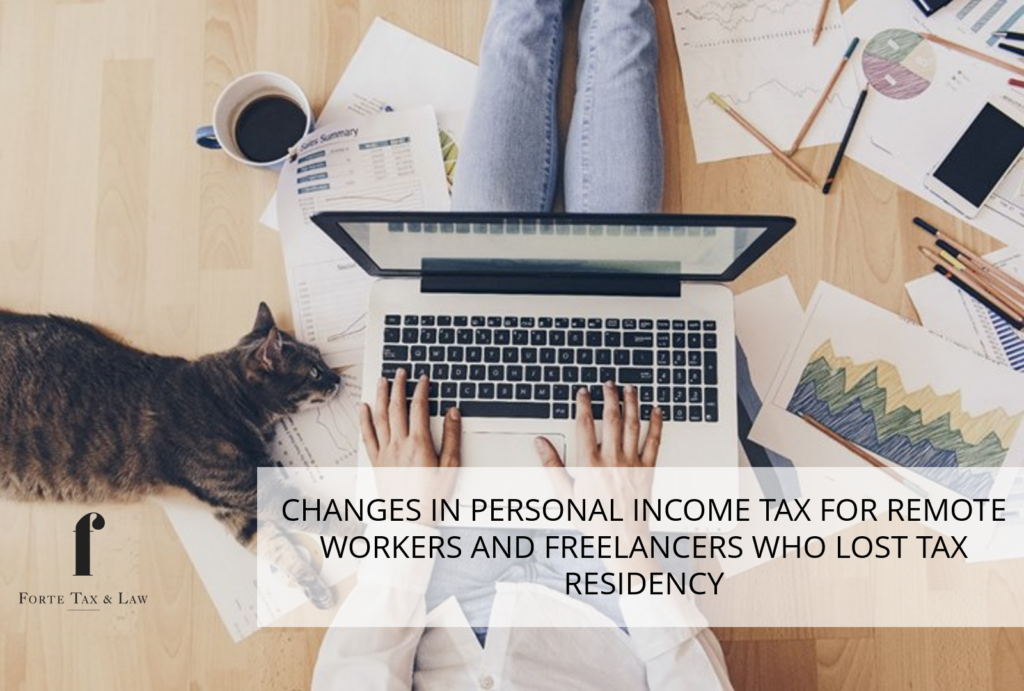Forte Tax & Law » News » Changes in personal income tax for remote workers and freelancers who lost tax residency
Changes in personal income tax for remote workers and freelancers who lost tax residency
On May 31, 2023, the Russian Government introduced Draft Law No. 369931-8 to the Russian State Duma. This draft law makes a number of amendments to the Russian Tax Code. One of the most significant changes is a revision of the procedure for taxing the personal income of those who have lost their tax residency and receive income from working remotely for Russian employers and income from the services they provide and the work they perform over the Internet. Below we will be dealing with the proposed amendments in more detail.

PIT[1] for remote workers
As proposed by the draft law, the income received by a remote worker from a Russian employer under an employment agreement should be treated as income from a source in Russia. In this case, such income will be taxed at 13%/15%, regardless of the worker’s tax residency. To tax the income earned under an employment agreement at 13%/15%, the following conditions must be fulfilled:
- Income is received under an employment agreement.
- The employer is a Russian entity or a separate division of a foreign entity registered in Russia. Furthermore, the income received from a separate division of a Russian entity located outside Russia will not be treated as income from a source in Russia.
Presently, if an employment agreement made with a Russian entity provides for remote work outside Russia, the income from such work will not be treated as income from a source in Russia. This income will be taxed at 13%/15% in Russia, only if a remote worker is a tax resident of Russia. If a worker is not a tax resident of Russia, the income from remote work outside Russia will not be subject to PIT in Russia.
This draft law, if adopted, will create a unified tax regime for remote workers, regardless of their residency.
Although these changes will place a heavier tax burden on workers working remotely from abroad, this version of the draft law may be considered as a compromise, because it was previously proposed that the income of remote workers who lost their Russian tax residency should be taxed at 30%.
If these amendments are adopted, we recommend remote workers who are working for Russian entities and are permanently based outside Russia to familiarize themselves with the provisions of applicable double taxation treaties, to determine the place of taxation of income from their employment and whether it would be possible to deduct the taxes they pay in Russia.
PIT for freelancers
The draft law also provides that the income from the services provided, the work performed, and the rights granted to use results of intellectual activity over the Internet will be treated as income from a source in Russia, if at least one of the following conditions is fulfilled:
- An individual is a tax resident of Russia; or
- Income is received by an individual in an account opened with a Russian bank; or
- Income is received from a Russian entity, a sole proprietor, a notary engaged in private practice, an attorney who has established a legal office, or a separate division of a foreign entity in Russia.
If at least one of these conditions is fulfilled, such income will be treated as income from a source in Russia and taxed at 13%/15%, regardless of the individual’s tax residency. This income was previously taxed at the place of residency.
These changes will first of all affect employees who work under civil law contracts and have lost their Russian tax residency and freelancers.
Foreign entities recognized as tax agents
As further proposed by the draft law, foreign entities will be recognized as tax agents when they pay income to individuals from the services provided, the work performed, and the rights granted to use results of intellectual activity over the Internet, if (i) such an individual is a tax resident of Russia or (ii) the income is transferred to an individual’s account opened with a Russian bank. A foreign entity will be required to register with Russian tax authorities not later than the date of the first payment of such income.
What happens next
The draft law will be considered in a first reading on June 20, 2023. Presumably, if the draft law is adopted, the amendments proposed with respect to PIT charged on the income of remote workers will take effect not earlier than 2024 and with respect to the income of freelancers, not earlier than 2025.
Should you have any further questions or wish to discuss any aspect in more detail, please email Anton Kabakov.
Sincerely,
[1] Personal income tax
